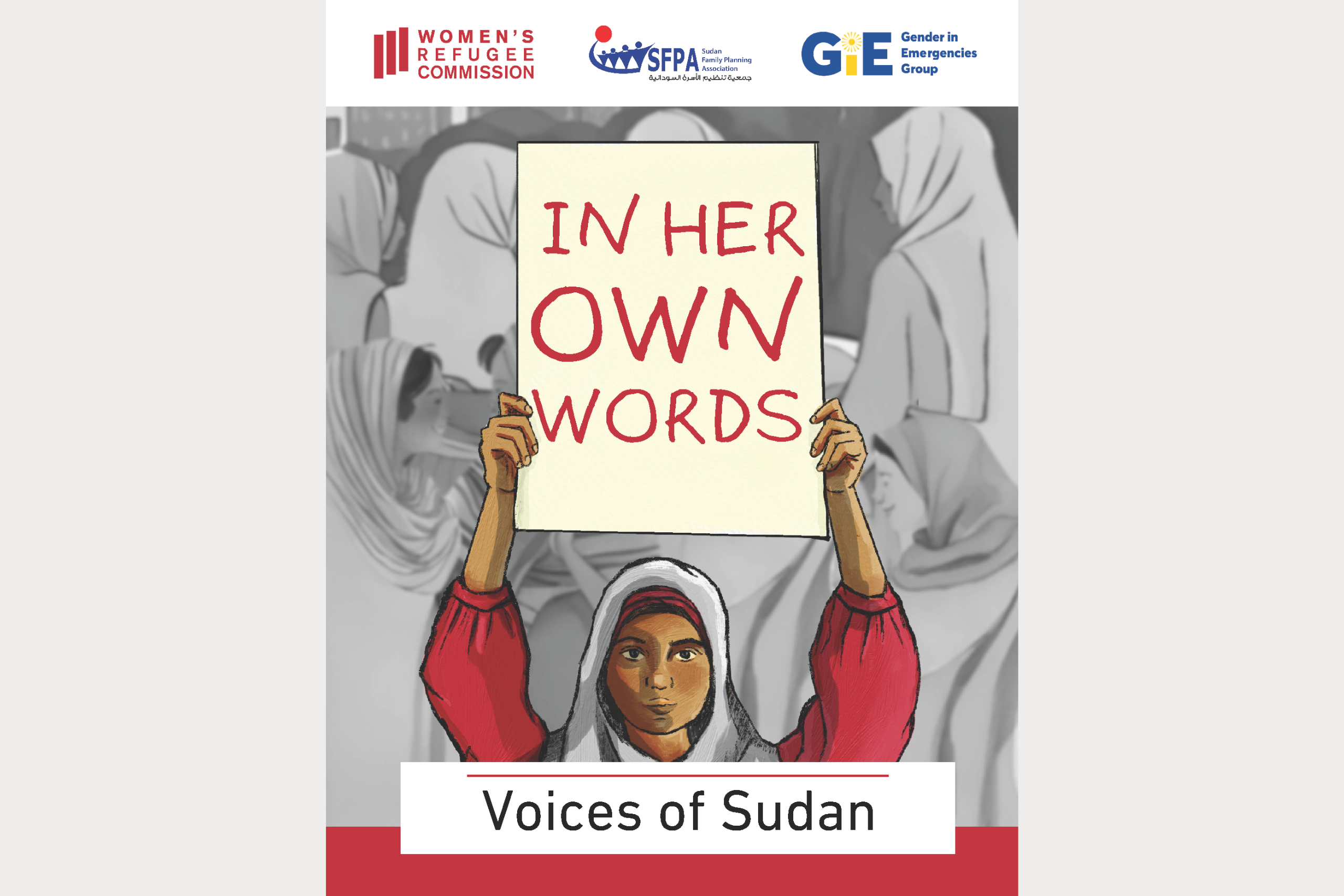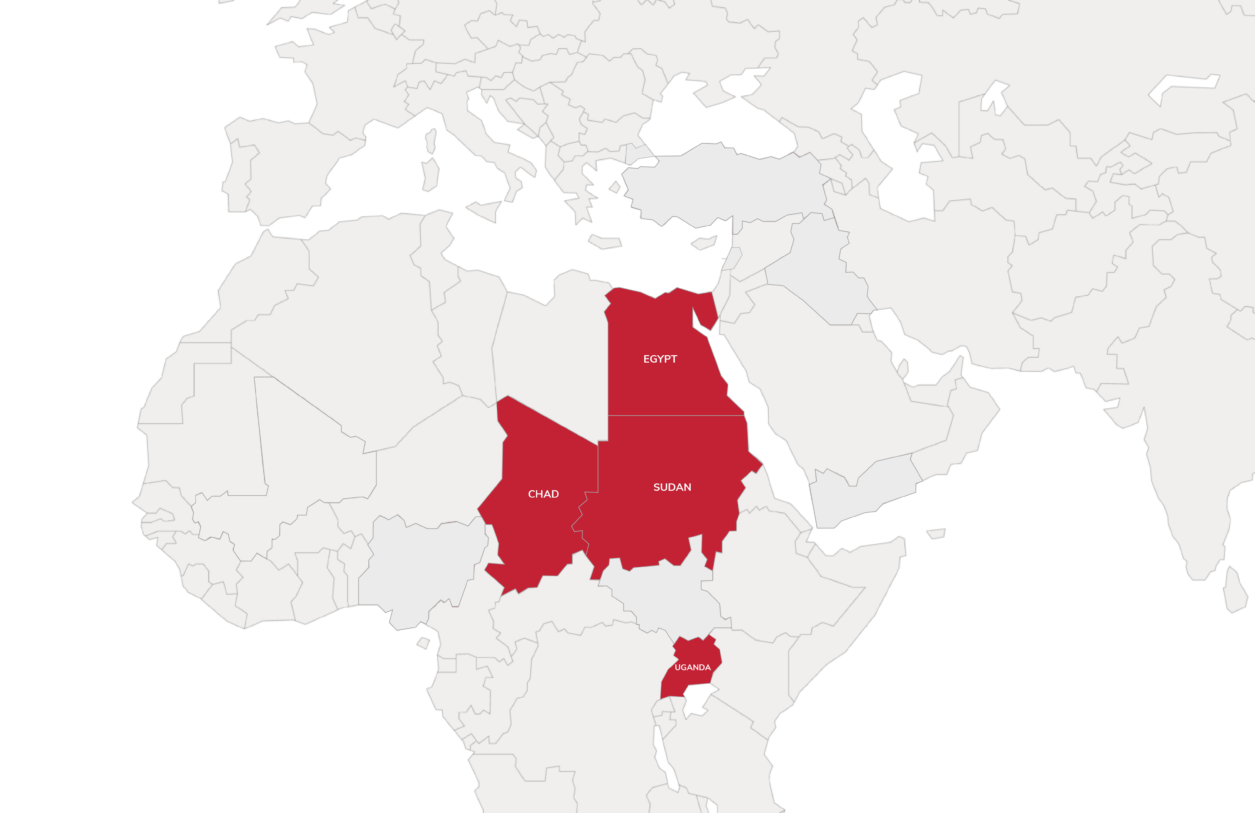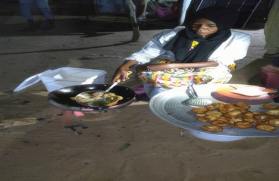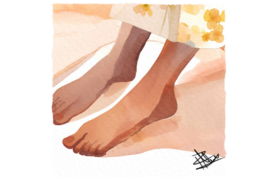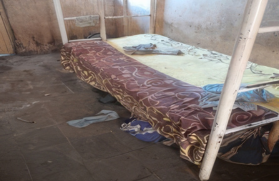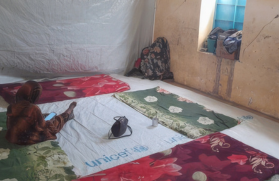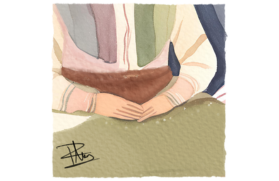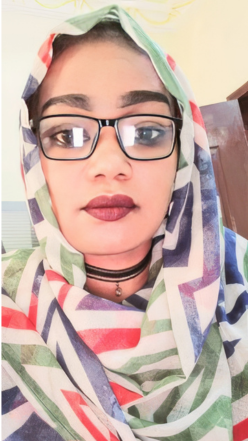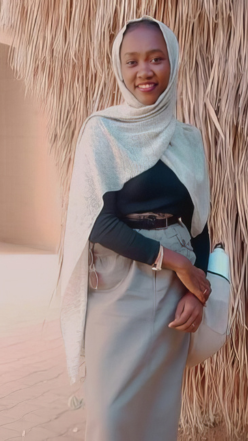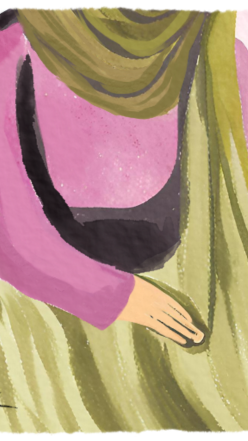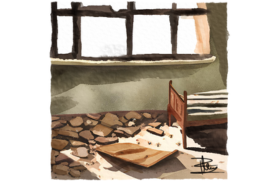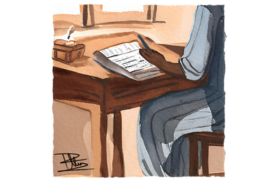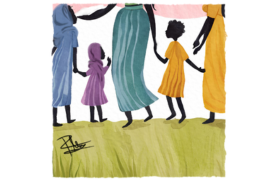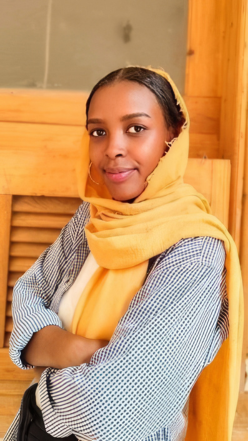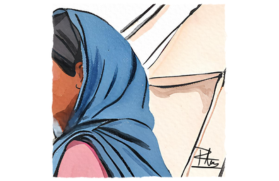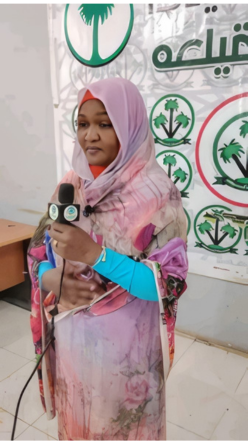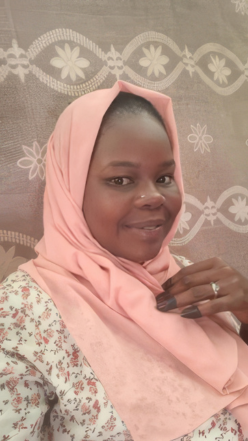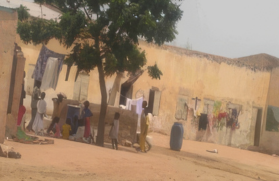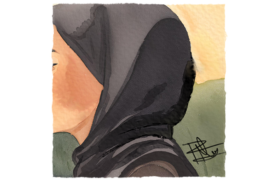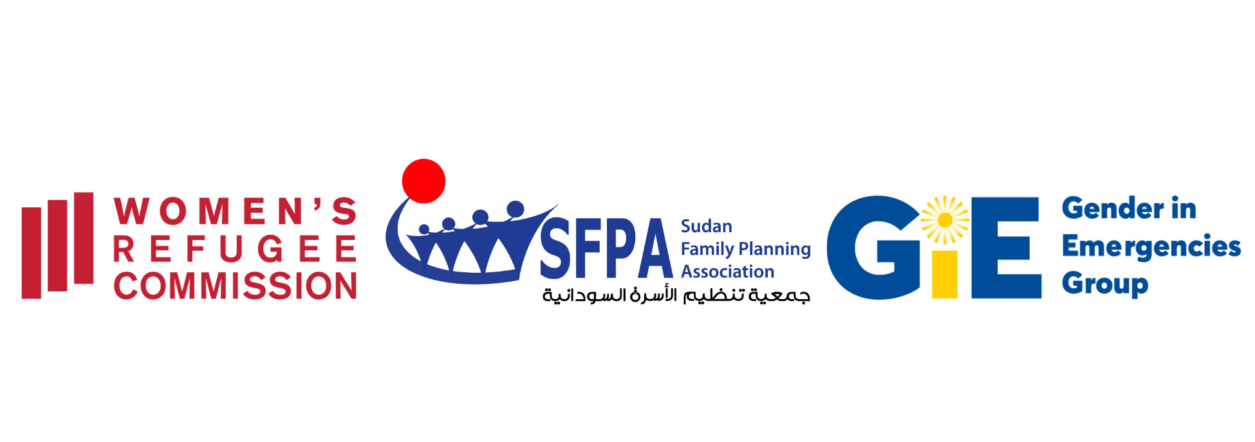My name is Susie Sir Al-Khatem Mohammed Abdullah. I was born in Farbrene in West Darfur. My father is from Hadandwa from the East. My mother is a Farawya (the Fur tribe) and my husband is a Masallati (Masalit tribe). I am married, my husband has been missing for five months, since April. After the Sennar attack, he moved to Damazin.
When I am asked, I say that I am from Western Darfur, since I was raised there and got married there. Masalit is a very large tribe. West Darfur is the Masalit and Fur area (Masalit, Fur, Borno, Tamma, and Barqu are all considered non-Arab tribes, the Arab tribes include Bani Halba and Misseriya). Masalit is one of the tribes that was exterminated and they were buried in mass graves during the war.
We have been in Khartoum for years. My father and mother are both teachers. My mother passed away, may God have mercy on her. My father is still alive, may God grant him a long life. I received my education in Khartoum. I have a master’s degree in administration and I am the president and founder of (Step Towards Development), an organization that works in the field of education. We live in Halat Khojali, Hillat Hamad and Al-Danakala. My mother’s family is from the West, but we are residents of Bahri. We used to live a normal and stable life. Before the war, no one in Bahri ever asked about the tribe. The population of Bahri is a mix of all tribes.
When the attack took place, I was in Khartoum at the land port. I went to send my little girl the Eid stuff. She was with her aunt in Gedaref. I was in the land port when the attack took place. I heard the bus driver saying, “Bahri, Bahri.” I immediately jumped on the bus, which started moving extremely fast. The driver said: “Whoever wants to get off can get off now, I am going to cross the bridge.” In fact, we were the last car that crossed the bridge. Afterwards, the Rapid Support [Forces] closed the bridge. I arrived to Bahri.
My daughters were alone with my aunt while our father was in East Nile. On the first day we witnessed every aspect of the harsh conditions while we were on Sayed Ali Street. We fully experienced the horror of beatings that the people went through. In the evening, the strikes intensified, the bullets kept falling from the skylight window, while we were sleeping in bed. I told them that we’d better sleep on the ground. We heard someone saying: “Point.” With this blow, the girls started screaming. All this happened before the morning so I took them into the room. My daughters, aunt, and I slept until the morning. I went outside to the hall and saw the shell that entered from the skylight window into the bed, where we were sleeping, and ended up inside the kitchen.
We stayed for four days, but our father couldn’t get to us. Our father is a car mechanic who has a workshop in East Nile. It took him four days to reach us. The girls lived in a state of extreme panic. Rahma, my eldest daughter, is a girl with special needs and kept screaming hysterically. I told my husband the girl couldn’t bear this situation. Our house is like any other house in Hallat Khojali, it has a large courtyard. My cousins left to go to my cousin’s house in Halfaya, but I refused to go with them and told them that we were going to wait for our father. We waited until he came and we headed together to Halfaya. Getting from our house to Halfaya turned out to be a terrible journey. We walked on foot from the house to Saad Gishra and from Hajj Al-Safy Hospital we found a car. The Rapid Support stopped the vehicles, dropped men off, searched them, and asked us where we were going. After a long ordeal, my daughters, aunt, and I arrived in Halfaya.
We left our father to guard the house in Halat Khoujali. We stayed in Halfaya for a month and a half. The period we spent in Halfaya is equal to all the days of the war. After a few weeks, when the Rapid Support arrived, all the people of Halfaya fled. My cousin’s family refused to leave their house. It was a big three-story house which was the highest house in the area. The Rapid Support used to come every day and ask us why we have stayed. We told them that we are a big family with more than 60 people in the house, including women, men, and children. The Rapid Support kept asking why we have stayed. We told them we had nowhere else to go. They would go in and search the house saying that there was an officer in the house, that’s why you are staying. We have witnessed the war and the clashes between the army and the Rapid Support. The question was where to go and how. We had no money. The money that we had was for food and our basic needs.
The people were trying to strengthen each other, saying that the war would stop and we shouldn’t leave and must stay together in Halfaya. Thank God, due to my experience during my work at organizations, people were not intimidated. Rahma, my daughter, who is a girl with special needs, was very much attached to her father; we used to go see him in Hallat Khoujali every two days, taking transportation from Halfaya to Haj Safi or the organization.
Before the war, I had food supplies for Ramadan and because there was no food or drink in Bahri and markets were closed, my daughters and my family distributed all the items in the early days of war. People were fasting and they had no sugar, dates, or hibiscus. We used to sit in the street in the afternoon and distribute food to people in Hallat Khojali. So, I knew that there was nothing at home. Every four or five days we used to leave early in the morning in order to find transportation from Halfaya. The risk of gunfire or shooting was always imminent. We would walk around the wall until our arrival to Khojali, to deliver food to our father. My mother’s cousins were staying with him. We used to stay there overnight and would leave to Halfaya early at 6:30 or 7:00 a.m. We continued in the same manner for a month and a half. I feel responsible for our father and the people who were staying with him who had no food and no money. It was easier for women to go out than men, because any man who came out would be arrested by the Rapid Support. I used to go out dressed with a torn shirt, while my daughter wore old pants and flip flops. When they asked us, we would say we’re getting food from Aldaim market.
After a month and a half, the situation was still difficult. The house of Aya, my cousin, was besieged by the Rapid Support. The area was evacuated by its residents and the Rapid Support continued besieging us. Every day they asked us why we didn’t leave. I wanted to leave because my little daughter was with her aunt in Gedaref. She cried every day, asking us to go to Khartoum. My aunt said we should go. I went to Bahri to get some stuff from our home for our travel.
Soon after our arrival, our father told us that the Rapid Support came and took him. Our neighbor who had a workshop told the Rapid Support that there was a car mechanic in our house. Subsequently, my father went with them to fix their car. They told him that they would come again the next day. During our stay, the Rapid Support knocked on the door and took our father to several areas in Khartoum. He returned terrified from the scene of the scattered dead bodies in Khartoum streets, the destroyed houses, and the broken streets. They took him to the spare parts section at Sajana market. They opened several shops and told him to take whatever he needed. He told us that he was petrified by the idea of a possible plane strike at the Rapid Support’s car that he was riding. After this incident, our father told me that he wanted to come with us, even though at the beginning he totally refused to leave the house. He pointed out that the Rapid Support would come every day for the maintenance of their vehicles. If he refuses to go with them, they might shoot him in the head. “Otherwise, if I work with the Rapid Support, I will feed my daughters from blood money.”
At 6:00 a.m., we gave our neighbor the house key and our father told him that he was going to escort his children to Halfaya and would come back to the house in the evening. We left the house with big bags on our heads, packed with our clothes and our belongings. We walked from Hallat Khojali to Saad Qashra, with Rahma, my daughter, our father, and my mother’s cousins escorting us. We found transportation to Halfaya. As soon as the Rapid Support saw us, they followed us in two cars and a motor. They asked us where we were heading. We told them, “To our cousin’s house and we’re going to stay with her.” They asked what’s inside the bags and they meticulously searched them. They waited for us until we entered the garden and kept watching us.
We stayed for one day and on the second day we traveled to Gedaref. We made our decision that we as a family had to leave, since my little girl is in Gedaref, my other daughter has special needs, and both are suffering from a terrible psychological condition. We left Halfaya by bus to Madani. When we got to Madani, we bumped into the Rapid Support. In the bus, people told us, “If you have money or gold, hide it because they are searching women and girls.”
The panic we experienced on our way to Madani was horrible, but praise be to Allah, we read the Quran. During the war and during our stay in Halfaya, we used to read the Quran every Thursday. We also prepared chickpeas and distributed them with sweet dumplings to people, even though we had nothing. We used to do simple things from whatever was available. The Rapid Support militias were very violent toward men, but they haven’t questioned women. This was at the end of the month of May. We left Khartoum at 7:00 a.m. and arrived at Gedaref at 11:00 a.m. We were delayed by the street conditions, including inspection vehicle parkings. Travel used to be less time-consuming.
We stayed in Gedaref for five and a half months, we enjoyed some stability. A number of people of the organizations whom I knew, members of my family, and my sister were in a village in Gedaref. We headed there. While we were on the way, I started preparing the girls, especially Reem, since it was their first time out of Khartoum. My daughter Reem doesn’t eat flat bread. I told them: “Here, there’s no bread, we have flat bread as well as red flat bread and I don’t need you to comment or say we don’t want to eat. People here are sensitive and they live a humble life.” I swear to God, my sister was generous to us and did as much as she could, but no matter what, there’s no place like home and its security.
Of course, after the war [broke out], I lost my job. My car was removed from Saganah. We took it for maintenance on Thursday and the war broke out on Saturday. My husband had his car removed from a workshop in Hillat Koko, because he left the car and walked on foot until we arrived in Hillat Khojali. My office, as well as the organization’s papers and the money, were all removed from the office in Al-Tadamon Tower at Municipality Street, but God will compensate us. I didn’t take the valuable items with me such as the organization’s headed paper, the stamp, and the laptop.
I tried to find a job in Gedaref but the competition was very intense. Although I previously worked in Gedaref, in the field of awareness, I did not work in the field of education, which is my organization’s field of work. During the period of five and a half months, I was a volunteer in raising awareness. As for our livelihood, we used to rely on the money earned from old goods that I bought from Egypt during Ramadan and divided them in two parts, part in Khartoum and the other part was sent to my sister in Gedaref. In fact, the money from the goods helped us during the war.
My aunt Fethiye came with us to Gedaref. She was an employee in the Ministry of Education’s storehouse. She had money and dollars saved for Hajj. This was the money that helped us and the family to get through these times. When autumn came, the girls became extremely tired of the situation, with the mosquitoes, the flies, and water everywhere. I have a friend who is a Gedaref resident, she gave me a house in the center of Gedaref, where we have stayed.
During this period, Madani was hit. We remained in a state of panic and fear. I returned to the girls and they kept saying, “They’ll hit us again. We can’t stay here.” The only solution was to go to Egypt, especially since all of our people went to Egypt and kept saying to us, “Why are you staying until now?” We heard that the Rapid Support had arrived in Al-Khayari area next to Gedaref. In fact, after the panic we experienced in Khartoum, it was difficult for us to stay, and let the girls go through the same experience again. We went to Atbara and stayed with members of our family for three days. Afterwards, we left. Our father came with us from Gedaref to Atbara and we rode cars to Egypt. Fethiye, my aunt, bought us tickets from Sudan to Egypt. I had gold jewelry which I sold to allow us to travel. I insisted that our father stay in Sudan to send us money, because there are no jobs in Egypt. I knew this fact very well.
Of course, we were smuggled. We stayed five days on the street. After a short while, we left Atbara, but a bit later, the car broke down in Atbara. We stayed in the open—in the street for a day and a half. Obviously, men and women were in separate areas and the bathrooms were in open air. We carried with us food and water supplies, and have fully experienced the frightening details of smuggling. We arrived in January during the cold weather, with blankets that were distributed to us in Gedaref. The people of the organizations have not failed us, they accompanied us to special shelters for displaced persons. Within the neighborhoods, there were distribution committees. I swear to God, these blankets that we brought to Egypt were of great benefit to us in winter here.
Afterwards, we moved to a place called Storage. It’s similar to a mountain, with a large number of Sudanese people waiting. During these waiting times, we filmed all these scenes. Thank God, we were two families together, my daughters, my aunt, and I. The other family consisted of a man, his wife, and his children, in addition to two strangers. Despite the difficulties of the journey, people have alleviated some of the fatigue of the trip. We tried as much as possible to prevent the children from feeling scared or nervous.
We stayed in Storage until the morning. They said, “Let’s get on the vehicles.” As soon as we moved, after about five minutes, we heard the sound of bullets. We were told that the Egyptian army or the Egyptian police shot on the vehicles travelling ahead of us. In a car, there was a guide making a sign for vehicles to move or stop in case of danger. Immediately, our cars returned. It took the second day and another afternoon until we heard that the street was open. Our car was the first car and it was at risk of an attack or a strike. Then the rest of the vehicles would either move forward or return. I can’t talk enough about the horror we experienced from the Storage until we entered the border of Egypt. The car was going too fast. The things people see in the media are all true and nothing is false. I mean, the car was so fast to the extent that if anything fell from it, it wouldn’t stop. If a bag fell or a person fell the car wouldn’t stop under any circumstances. We were 22 people in the trunk. Imagine every man, woman, and child was tied with ropes so that no one would fall from the car.
We kept the children in the middle. I was holding Rahma, my daughter, with one hand and with the other hand I was holding Amal, our cousin. I kept holding them for seven or eight hours. When I arrived in Egypt, I couldn’t spread my hands for three days. My whole body was swollen from the contact with the iron in the car.
Thank God, we arrived in Aswan. It is an area where the vehicles gather to transport people to residential areas. They call it the thugs’ area. Anyone who rides the car can’t utter a word and it is normal to be mugged. On the way, you might get out of the car without anything and you could be left in the middle of the road. We were lucky that we had a man with the other family who helped us and stood by us to prevent anyone from deceiving us. In fact, when we got tired of talking to the vehicle people, we sat on the ground and told them we were not going anywhere. Eventually, this man found us a car.
A nice Egyptian boy took us to the compound in Aswan, which was allocated to smuggling people. All the people who were in the car trunk stayed in the same apartment which consisted of one room and a hall. We were 11 people. The compound is at the beginning of the Kassarat area. The vehicle people take you to the compound because they get a commission from the apartment owners. We stayed there for one night. On the second day at sunset, the bus traveling to Cairo came. They told us to get up, when the bus arrived. We got up, took our stuff and belongings and went on the bus and travelled from Aswan to Cairo. By God, on the way from Sudan to Egypt, I read every verse in the Quran that I memorize. In the bus we were terrified since we were all Sudanese and anything might happen to us on the roads, the police might stop us, and make us return to Abu Simbel or Sudan. We arrived after 17 hours. Afterwards, we stayed with my brother, his children, and his family. On the third day, I started to search for an apartment and I found this apartment. We stayed here because it was cheap. It also has some furniture and the kitchen includes everything.
My aunt and I paid the rent from some of the money we had. Our first concern was how we were going to live, from where to eat and drink. The first idea that came to my mind was to open a shop for Sudanese products. In fact, we rented the shop on the street next to our rented apartment and named it “Touha Tex” after my aunt. Life was good and I also benefited from my previous experience when I used to bring goods to Egypt, of course before the war.
Until four months after our arrival, things went well because our father used to send us the apartment rent. The food, drinks, and the shop rent were paid from the shop earnings. I even thought of enrolling the girls at school.
The situation became difficult after the disappearance of our father, four months ago. The last contact with him was on April 19. He told us that he had sent us the rent, because the rent payment is due on the 20th of each month. He said he was going to Al-Damazin due to lack of work after the attack. From the time he left to Damazin, we have no news of him. The phones are off. I tried to contact his family. They left Sennar after the attack, heading to Port Sudan and said they didn’t know anything about him.
Until this moment, neither we nor his family know anything about him. His friends said that Adam left to Al-Damazin. I called the people I knew there and told them to ask about a person whose name is Adam Jabara. They asked about him in all the auto repair shops, but couldn’t find him, they said the phone might either be locked or stolen.
I contacted everybody in Al-Damazin. Someone said, “He went to Bao area because work is good there.” He wasn’t found in Bao either. The man added, “Thank God, the Lord of the Worlds, and may God return him safely.” The problem is that the father was responsible for the girls before his disappearance. Reem, my daughter, was in contact with him and asked him to send her the fees for the intermediate certificate exam. She studied from home and registered for the exam. When he didn’t answer, I managed to get the amount of 2,800 Egyptian pounds (US$56.70). Thank God, Reem was tested in Beit Al-Sudan and got a good result.
Every day I try to reassure them about their father. The problem is that life in Egypt is extremely difficult and the suffering is great. Now I rely on the shop for our livelihood but the shop has no goods. We are failing to pay the rent. Every day we think what day of the month it is! If Adam doesn’t show up, what are we going to do? I thought of finding a job. There are no jobs in organizations. I went with our neighbor to work in a factory. The monthly salary is 3,000 Egyptian pounds ($61), the day starts from 8 a.m. till 8 p.m. The employees are not allowed to move from 8:00 a.m. till 2:00 p.m., except during the prayer break and food break. They must return to their work before the end of the break. Egyptians are also very provocative. We finished our day at 8 p.m. and decided not to come back.
Afterwards, we tried the organizations and received the UNHCR card as of July 31, 2024. We haven’t seen anything from them. We went to Caritas for an assessment for payments, but they told us to wait until the beginning of 2025. We also applied for the 1,200 pound ($24.50) school grant from the Catholic Refugee Organization. There were many people and it was difficult to get in. In the end, I entered with the documents. That was a month ago, but we haven’t received any response and the school has already started. We have also tried an organization for people with special needs to enroll Rahma who insisted on going to school. She has a better school score than her sisters. She passed with a grade of 244 in the middle school in Sudan, but things are more complicated in Egypt.
The suffering I have experienced in Egypt is so intense. I have no choice and can’t leave this apartment. There are rents at 1,500, but the areas are difficult and crowded. The people also told me, “If you leave this apartment, you will not get a similar one for 3,000 pounds.” Of course, the area we currently live in is the area of drug dealers and all types of narcotic pills. We live normally here and say hello to them. They have no issue with you if you don’t get involved in their business, but the problem is that every three days there is some kind of trouble with a knife or a machete stabbing with blood everywhere. The girls see all these things. Evidently, these things affect the psychology of the girls.
I am sure that my situation is better than that of many people. There are people who live in very difficult situations, such as widows, orphans, and children with disabilities, who have only sheets on the floor and nothing of the life essentials in their apartments. Of course, the question of schools is still a dream for families living here.
People left Sudan looking for safety and for the support of organizations, which previously used to pay and help with housing, food, and education. I have not seen any help from any organization in Egypt. We arrived at the beginning of the year and no one could care less about us.
We had a good life in Sudan, before the war. We had a house that belonged to us and I used to work, my husband used to work as well. He had an auto repair workshop, he had a car, and my daughters were at school. Rahma my daughter was enrolled at a center for people with special needs. She is supposed to take the Sudanese certification exam and I invested in her as a little girl, she entered Sudanese schools until the fourth grade and then I transferred her to a school for people with special needs. Hence, I remained interested in teaching people with special needs. Undoubtedly, schools for people with special needs are very expensive. The fees are around 10,000 to 15,000 Egyptian pounds. Of course, we don’t have the ability to pay these amounts.
In Egypt, most families register their children in turns, each year one of the children enters school or sits for the exam, because the resources are poor for all people and the cost is high.
My daughters need psychological support. Reem, my middle daughter, started speaking very loudly although she was a very quiet girl, possibly due to the air strikes on our backyard in Halfaya. Apart from the planes, we men and women used to lie on the ground from the sound of the shells and bullets. Even Amna, the little girl in sixth grade who didn’t witness the war with us, but heard stories of the war and the smuggling, currently suffers from involuntary urination. I believe that all my daughters need psychological support. Rahma also needs support, especially since she was badly affected by the war and her father’s absence.
From my point of view, tomorrow is uncertain. It may be better if the war is over and is stopped, and if the disease called Rapid Support ceases to exist.
As for refugee women in Egypt, their situation is unpredictable because they haven’t received their rights from UNHCR. We are under the protection of the United Nations, considering that we have fled a war and have moved to another country seeking security. We suffer and cannot find anyone who can grant us our rights.
There is no way to protest because we are in a very difficult country, where no one can express his opinion or protest, especially us the refugees.
Peace begins with women. The woman is the one who raises and educates. She can hold a gun from her son, her husband, and her father. Women are capable of great endurance. I can say that 90 percent of Sudanese women in Egypt are the bearers of family burdens. Thank God that I am blessed with daughters who alleviate my worries and stand by me at all times. Even with the school issues, they said, “Mother, there is no problem, school is not necessary this year.”
Thank God that my daughters are with me, as well as my aunt Fethiye, who just had a stroke and drags her leg, but despite her illness, she helps me in the shop. Here in Egypt, every person is preoccupied with his own concerns and problems unlike Sudan, you find people who support you. Your brother, your sister your cousin, your neighbors, and your friends, all of them provide support and assistance.
I am happy to tell you my story, as it is a good thing when women recount their suffering and share it with each other. In fact, I feel very comfortable after talking to you. Thank you very much.

